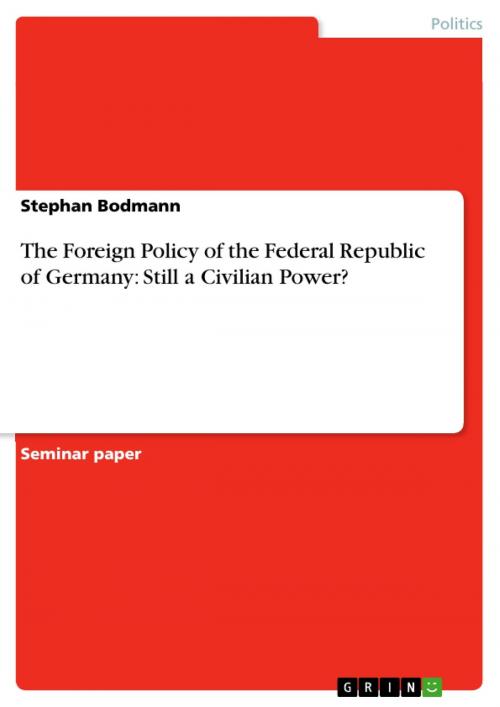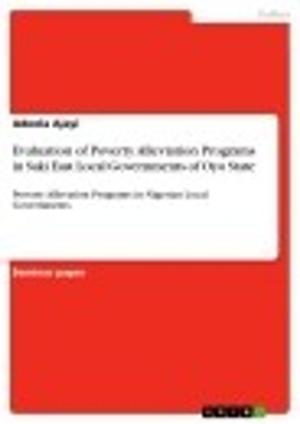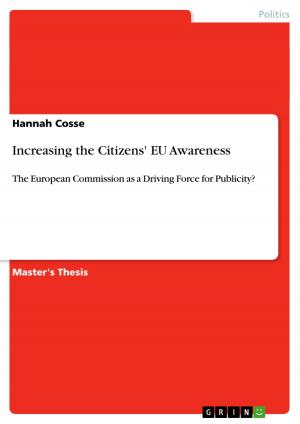The Foreign Policy of the Federal Republic of Germany: Still a Civilian Power?
Nonfiction, Social & Cultural Studies, Political Science| Author: | Stephan Bodmann | ISBN: | 9783640524693 |
| Publisher: | GRIN Publishing | Publication: | February 2, 2010 |
| Imprint: | GRIN Publishing | Language: | English |
| Author: | Stephan Bodmann |
| ISBN: | 9783640524693 |
| Publisher: | GRIN Publishing |
| Publication: | February 2, 2010 |
| Imprint: | GRIN Publishing |
| Language: | English |
Seminar paper from the year 2009 in the subject Politics - International Politics - Topic: German Foreign Policy, grade: 72 (distinction), Durham University (SGIA), language: English, abstract: Die Arbeit behandelt die Frage, ob die Außenpolitik der Bundesrepublik Deutschland nach wie vor als diejenige einer sog. 'Zivilmacht' angesehen werden kann. Hierzu wird nach einer kurzen Einführung auf die Entstehungsgeschichte der Bundesrepublik sowie die Eigenschaften des 'Zivilmacht'-Konzeptes eingegangen. Im Anschluss daran werden die entscheidenden Ereignisse beleuchtet, die zu der Erosion des 'Zivilmacht'-Konzeptes geführt haben, insb. das deutsche Engagement im Kosovo (1999) und in Afghanistan, sowie das 'Nein' zum Irakkrieg. The essay deals with the question of whether the foreign policy of the Federal Republic of Germany may still be considered that of a so-called 'civilian power'. Following a brief introduction, the history of the Federal Republic and the characteristics of the 'civilian power' concept are discussed. Subsequently, the decisive events that led to the erosion of the 'civilian power' concept, especially the German engagement in Kosovo (1999) and Afghanistan, as well as the 'no' to the war in Iraq make up the second part.
Seminar paper from the year 2009 in the subject Politics - International Politics - Topic: German Foreign Policy, grade: 72 (distinction), Durham University (SGIA), language: English, abstract: Die Arbeit behandelt die Frage, ob die Außenpolitik der Bundesrepublik Deutschland nach wie vor als diejenige einer sog. 'Zivilmacht' angesehen werden kann. Hierzu wird nach einer kurzen Einführung auf die Entstehungsgeschichte der Bundesrepublik sowie die Eigenschaften des 'Zivilmacht'-Konzeptes eingegangen. Im Anschluss daran werden die entscheidenden Ereignisse beleuchtet, die zu der Erosion des 'Zivilmacht'-Konzeptes geführt haben, insb. das deutsche Engagement im Kosovo (1999) und in Afghanistan, sowie das 'Nein' zum Irakkrieg. The essay deals with the question of whether the foreign policy of the Federal Republic of Germany may still be considered that of a so-called 'civilian power'. Following a brief introduction, the history of the Federal Republic and the characteristics of the 'civilian power' concept are discussed. Subsequently, the decisive events that led to the erosion of the 'civilian power' concept, especially the German engagement in Kosovo (1999) and Afghanistan, as well as the 'no' to the war in Iraq make up the second part.















